A Bottle of Dew Class 6 Questions and Answers
A Bottle of Dew Question Answer Class 6 English Poorvi Chapter 1
Let us do these activities before we read (Page 1)
Question 1.
Circle the picture that matches with each word. Check your answers by sharing them with your classmates and teacher.
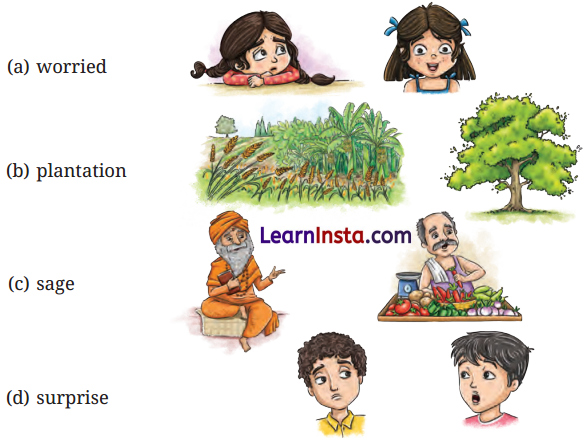
Answer:
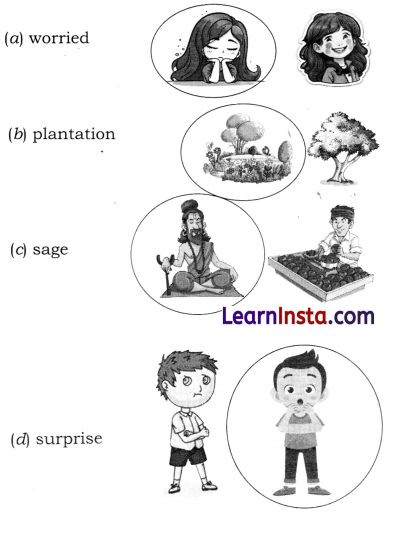
Question 2.
Answer these questions and discuss them with your classmates and teacher.
(a) Think of a time when you worked hard. What did you do then?
(b) How did it help you?
(c) How did it make you feel?
Answer:
Do it yourself.
![]()
Let us discuss (Page 3)
Question 1.
What did Rama Natha believe?
Answer:
Rama Natha believed that there was a magic potion that could turn any object into gold.
Question 2.
How did the sage help Rama Natha?
Answer:
The sage understood that Rama Natha did not want to work but wanted gold without putting in any effort. He told him to plant a banana plant and collect the morning dew and store it in a bottle. He assured him that he would convert it into the magic potion by chanting some magic words.
Question 3.
Do you think Rama Natha will be able to collect the dew? Give a reason.
Answer:
I think Rama Natha will be able to collect the dew because he is desperate to get the magic potion.
Let us Discuss (Page 5)
Question 1.
Why was Rama Natha angry?
Answer:
Rama Natha was angry because the copper vessel didn’t convert into gold after the sprinkle of dew drops as the sage told him to do.
Question 2.
How did Rama Natha and Madhumati create wealth?
Answer:
They created wealth by their hard work in the plantation of banana trees and selling them in the market for six years.
Let us Think and Reflect (Pages 6-7)
Question 1.
Read the following lines and answer the questions that follow.
(a) He spent all his time to learn about the magic potion. People cheated him often, promising to tell him about it, but he did not give up. His wife, Madhumati, was tired of this and also worried because she saw how much money Rama Natha was spending. She was sure that soon they would be without money.
(i) Complete the sentence with a suitable reason.
Rama Natha did not ‘give up’ because ________
(ii) Read the column which shows ‘what happened’ and write the correct outcome in the next column.
| What Happened | Outcome |
| (a) People promised to tell Rama Natha about the magic potion. | |
| (b) Rama Natha was spending a lot of money. |
(iii) Write whether the following statements are True or False.
(a) Madhumati was troubled about what her husband did. ____
(b) Rama Natha was very happy digging his fields. ____
(c) The sage wanted to show the right path to Rama Natha. ____
Answer:
(i) He did not want to work but wanted wealth, he wanted the magic potion.
(ii)
| What Happened | Outcome |
| (a) People promised to tell Rama Natha about the magic potion. | People cheated Rama. |
| (b) Rama Natha was spending a lot of money. | His wife was tired of this. She was sure that soon they would be without money. |
(iii) (a) True
(b) False
(c) True
(b) Carefully, he took the bottle to the sage. The sage smiled and muttered something over the water. Then he returned the bottle and said, “Try it out. ” Rama Natha sprinkled a few drops on a copper vessel and waited for it to turn to gold. To his surprise nothing happened!
(i) Choose the option that lists the events given below in the correct order.
(a) The sage smiled.
(b) Rama Natha gave the bottle to the sage.
(c) Rama Natha dropped a few drops of water on a copper vessel.
(d) He said something in a low voice over the water.
(e) Rama Natha waited to see if the magic worked.
1. a, e, d, b, c
2. b, a, d, c, e
3. c, d, a, b, e
4. a, d, b, e, c
(ii) Fill in the blank with the correct word from the lines given above.
Seeing that the plant had dried up, the gardener ………. some water on it.
(iii) How might Rama Natha have felt when nothing happened to the copper vessel?
Answers:
(i) 2, b, a, d, c, e
(ii) Seeing that the plant had dried up, the gardener sprinkled some water on it.
(iii) Rama Natha must have been very disappointed and sad. He must have felt cheated.
![]()
Question 2.
Answer the following questions.
(a) What did the sage ask Rama Natha to do to make the magic potion?
(b) Why did the sage ask Rama Natha to do everything himself?
(c) How could Rama Natha have a big banana plantation after six years?
(d) How did the sage make Rama Natha believe that there is no magic potion?
(e) Fill in the ‘before’ and ‘after’ table about Rama Natha.
| What he did before meeting the sage | What he did after meeting the sage |
| 1. | 1. |
| 2. | 2. |
Answers:
(a) The sage asked Rama Natha to plant a banana plant and water it with his hands. He told him to collect the morning dew from the leaves and store it in a bottle. He told him to collect five litres of dew and bring it to him.
(b) The sage asked Rama Natha to do everything himself because he wanted Rama Natha to work hard. The sage knew that Rama Natha was not hardworking and was only looking for easy money. The sage used his wisdom to make Rama Natha work.
(c) Rama Natha had to collect five litres of dew but winter is only for a few months so it would take him ages to collect the required dew. The sage had asked him to plant as many banana plants as he wanted so he had a big banana plantation.
(d) The sage told Rama Natha that there is no magic potion that can turn things into gold. He reminded Rama Natha that how hard he had worked. He looked after the land and the plants all by himself. He collected the dew with his own hands. He worked hard and created the plantation which yielded wealth. Madhumati sold the bananas in the market and collected gold coins. He remarked that it was only their hard work that created wealth, not magic.
Rama Natha was convinced that there was nothing called ‘magic potion’ that could convert anything into gold, only hard work can.
(e)
| What he did before meeting the sage | What he did after meeting the sage |
| 1. Rama Natha spent all his time to learn about the magic potion. | 1. He cleaned his fields. He planted rows and rows of banana plants. |
| 2. In winter he collected five litres of morning dew and took it to the sage. | 2. Rama Natha sprinkled a few drops on a copper vessel, waited but nothing happened. He learnt there is no magic potion. Only hard work can change one’s fate like magic. |
Let us learn (Pages 8-9)
Question 1.
Read the following words from the story.

Use the words correctly to complete the paragraph given below. There are two extra words in the box that you do not need.
There was a farmer who had a ……… coconut plantation. He worked hard and did not depend on …… . Every day was …….. but he did not give up. One day, a man bought a bag of coconuts from him, and ………. to pay him the money the next day. Days passed and the man did not pay him anything. The farmer felt ……… . About two months later, he met the same man and asked him about his money. The man said, “Oh! I had forgotten. Now, I ……… buying coconuts from you.” And he paid the money.
Answer:
huge, luck, difficult, promised, cheated, remember
Question 2.
Read the words from the story in Column
A. Read the new words in Column
B. Complete the meanings of the words given in Column B. Meanings of some words are given.
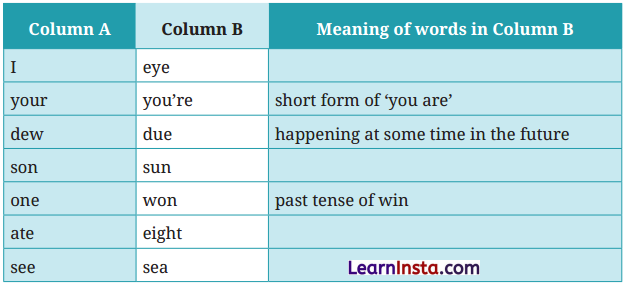
The words given in each row of the table above have the same sounds but different spellings and meanings. Such words are called homophones.
Answer:
| Column A | Column B | Meaning of words in Column B |
| I | eye | sense organ of sight we see with it. |
| Your | you’re | short form of “you are” |
| dew | due | happening at some time in the future |
| son | sun | star that shines during the day. |
| one | won | past tense of win |
| ate | eight | number, one more than seven. |
| see | sea | Salty water that covers a large part of the surface of the earth. |
Question 3.
Choose four pairs of homophones from the table above, and for each pair write a sentence that uses both homophones in the same sentence. Check your answers by sharing them with your teacher and classmates. An example has been given below:
I ate eight bananas for breakfast today.
Answer:
1. I have a red due to infection.
I have a habit of rubbing my left
2. You’re getting late for your music class.
3. The dew was shining due to the bright sunlight.
4. The woman told her son not to play in the sun.
5. Not one but two players won the trophy.
6. He ate elight cherries.
7. I want to see the sea.
![]()
Question 4.
Match the phrases in Column A with the phrases in Column B. Use the connecting words given in the middle column to make meaningful sentences.
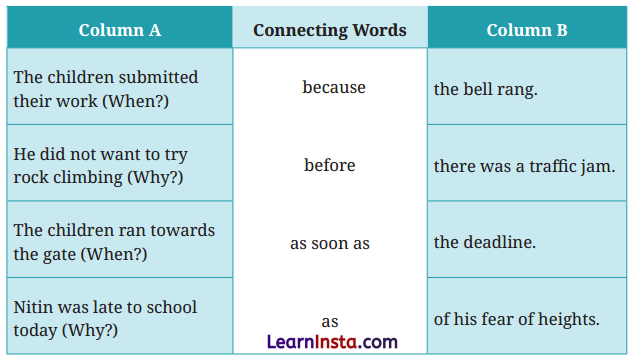
Now, write the new sentences in your notebook.
Answer:
1. The children submitted their work before the deadline.
2. He did not want to try rock climbing because of his fear of heights.
3. The children ran towards the gate as soon as the bell rang.
4. Nitin was late to school today as there was traffic jam.
Question 5.
Here are two sentences with letter ‘b’.
Read them slowly the first time. As you read them a few more times, read them faster each time.

Now, try to create a tongue twister on your own and share it with your peers.
Answer:
Common tongue twisters
- How much wood would a woodchuck chuck if a woodchuck could chuck wood.
- She sells sea shells by the sea shore.
- The sixth sick sheep stays in shelter of the shepherd.
Let us listen
You will listen to what Madhurnati does with the bananas In her plantation. Asqou listen, number the events in the correct order in which they happen. Write the number In the box beside each event. (refer to NCERT page 36 for transcript)
(a) Gives two bananas to a boy who is hungry []
(b) Meets her friend Kalawati in the market []
(c) Visits her mother and gives her two dozen bananas []
(d) Chooses to go home as only some bananas were left []
(e) Visits her neighbour and gifts them a bunch of bananas []
(f) Gives twelve bananas to her friend []
(g) Goes to the market to sell the bananas []
Answer:
(a) Gives two bananas to a boy who is hungry [6]
(b) Meets her friend Kalawati in the market [3]
(c) Visits her mother and gives her two dozen bananas [1]
(d) Chooses to go home as only some bananas were left [5]
(e) Visits her neighbour and gifts them a bunch of bananas [7]
(f) Gives twelve bananas to her friend [4]
(g) Goes to the market to sell the bananas [2]
Let us speak (Pages 10-11)
Question 1.
Read aloud the following words from the story.

All these words have the letter ‘s’ in them. But the sound of letter ‘s’ is not always the same.
- in sage and promising – the letter ‘s’ has a /s/ sound
- in wisdom — the letter ‘s’ has a /z/ sound
- in trees — the letter ‘s’ has a /z/ sound
- in surprise — the first letter ‘s’ has a /s/ sound and the second has a /z/ sound
Now, speak each word clearly along with your teacher and classmates.
Your teacher will now say some words. Listen carefully to the sound of ‘s’. Write the sound next to the word.

Answer:
Do it yourself.
Question 2.
Discuss the following questions with a partner. You may use the hints given in brackets while speaking.
(a) What does hard work mean to you?
(It means ……/It is something ……/Well, you see…/What I mean is …)
(b) Give three reasons why you think hard work is important.
(Firstly, I feel …… because …… /Secondly, I think ….. since ……/Lastly, I believe ….. as …..)
(c) Share three ideas you would give to someone who needs to work hard.
(To begin with, it is important that ….. /Next, you could …… /Finally, I think you should …)
Answers:
(a) It means a great deal of effort or endurance. It is something like magic, it can change your fate.
(b) Firstly, I believe it can help you achieve your goals because it helps you build confidence and a confident person always wins, Secondly, I think hard work is the only key to success since a person who shirks work cannot achieve anything.
Lastly, I believe success cannot come without hard work as success and hard work go hand in hand. The harder you work the better you become.
(c) Do it yourself.
Let us write (Pages 11-12)
Question 1.
Work in pairs to complete the description of a banana. You may take the help of the words given in brackets. Share your answers with your classmates and teacher.
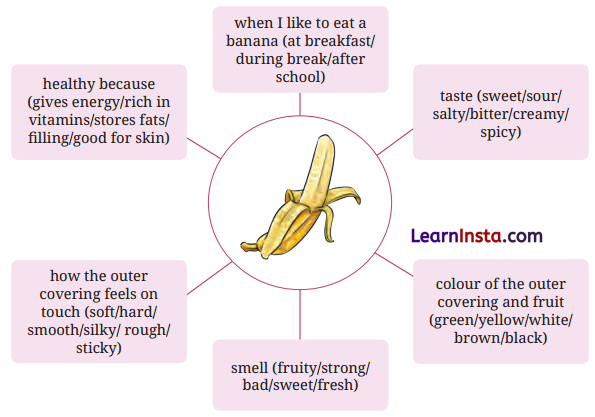
Now, use the information given in the picture to write eight sentences about a banana. Share your responses with your classmates and teacher.
Answer:
- Banana is a very popular fruit. It is nicely packed with a thick, fibrous skin.
- It is easy to peel.
- Raw bananas have a green skin while the ripe bananas have a yellow skin with some black spots on it. The skin is smooth and silky.
- Bananas have a sweet aroma and are very nutritious.
- Billions of bananas are eaten world wide every year.
- Bananas are full of vitamins and minerals. They are available all year round. They are easy to digest. Bananas are rich source of dietary fibres.
- Bananas are used for making snacks and desserts also.
- Bananas split, banana cream cookies, cab chips are some of my favourite banana recipes. A banana a day keeps us healthy in every way.
![]()
Question 2.
On the basis of the story ‘A Bottle of Dew’ develop a script with dialogues and enact It with expressions. Present It in the assembly or your classroom.
Answer:
Do it yourself.
Let us Explore (Page 12)
Find out the varieties of bananas which are grown, cultivated and eaten in different parts of India. You can find information about them from websites such as:
https: / / nhb.gov.in/pdf/fruits/banana/ban013
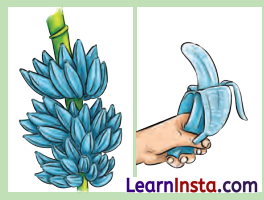
There is a special kind of banana called the Blue Java banana. This banana has got its name from its blue skin. It is also known as Ice Cream banana as it is so creamy and tastes like ice cream. It is grown in South East Asia and Hawaii. These banana plants grow to a height of fifteen to twenty feet.
Answer:
Do it yourself.